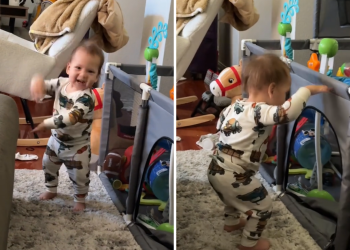Ahead of Supreme Court arguments over the future of TikTok, critics have warned that banning the popular social media app in the United States would be an assault on free speech. For some Republican lawmakers, that’s at least part of the point — and there’s a very specific type of speech they want to squash: pro-Palestinian sentiments.
Republicans have been discussing banning TikTok since Donald Trump’s first term, with a plethora of justifications centered around Chinese interference. But in the wake of Hamas’s October 7 attack on Israel, conservatives have become hyper fixated on policing pro-Palestinian messages on the app, accusing TikTok of influencing young Americans to “support Hamas” and favoring pro-Palestinian content. TikTok, for its part, has vigorously defended itself against the perception that it favors Palestinian perspectives and asserted that its algorithm does not “take sides.”
Nina Smith, a political communications strategist and former senior adviser to Stacey Abrams, said the GOP’s messaging around TikTok and Palestine is emblematic of the party’s double standards on free speech. “They’re pushing for their ability to say all manner of things on the internet. And yet they want to try and censor people who are very concerned about, justifiably concerned about what’s going on in the Middle East,” Smith said. “And so it’s absolutely a freedom of speech violation.”
The de facto ban on TikTok was tucked into a $95 billion legislative package for aid to Ukraine and Israel that Congress passed in April. The legislation required TikTok’s parent company, ByteDance — which is based in Beijing, China, and incorporated in the Cayman Islands — to either sell to an American company or face a nationwide ban. TikTok countered that the law did not provide the company with enough time to find a suitable buyer and have ByteDance divest its asset. The Supreme Court took up the case after the U.S. Court of Appeals for the D.C. Circuit ruled against the company in December, and the justices will hear arguments on Friday.
Blaming TikTok
Republican lawmakers’ handwringing about TikTok users speaking out about Gaza began in the early days of Israel’s now 15-month war on the enclave.
“Good old TikTok: Chinese spy engine and purveyor of virulent antisemitic lies,” Republican Sen. Josh Hawley, R-Mo., tweeted in late October 2023.
In an op-ed the following month, Rep. Mike Gallagher, R-Wis., argued that the Chinese Communist Party was using TikTok to push anti-Israeli propaganda. “How did we reach a point where a majority of young Americans hold such a morally bankrupt view of the world? Where many young Americans were rooting for terrorists who had kidnapped American citizens — and against a key American ally? Where were they getting the raw news to inform this upside-down worldview? The short answer is, increasingly, via social media and predominantly TikTok,” wrote Gallagher.
Other Republicans expressed similar perspectives following the passage of the de facto ban. While discussing pro-Palestinian protests on college campuses in May, Rep. Mike Lawler, R-N.Y., a co-sponsor of the TikTok ban legislation, argued that the platform was manipulating young Americans against Israel. “I don’t think there’s any question that there has been a coordinated effort off these college campuses, and that you have outside paid agitators and activists,” he said on a call with university trustees, as The Intercept previously reported. “It also highlights exactly why we included the TikTok bill in the foreign supplemental aid package because you’re seeing how these kids are being manipulated by certain groups or entities or countries to foment hate on their behalf and really create a hostile environment here in the U.S.”
Sen. Mitt Romney, R-Utah, echoed his colleagues’ messaging. “Some wonder why there was such overwhelming support for us to shut down potentially TikTok or other entities of that nature,” said Romney at a forum in May. “If you look at the postings on TikTok and the number of mentions of Palestinians, relative to other social media sites — it’s overwhelmingly so among TikTok broadcasts.”
The congressional fixation on TikTok’s influence on discourse over the war in Gaza was so intense that the company felt the need to address it in a recent filing to the Supreme Court. “Allegations that TikTok has amplified support for either side of the Israeli-Palestinian conflict are unfounded,” wrote TikTok’s attorneys in the brief. “The allegation was nonetheless a substantial focus of congressional deliberations.”
TikTok has also pointed to its large user base from the Middle East and Southeast Asia as a possible explanation for more content about Palestine than about Israel on the platform. (Another explanation for the discrepancy is that TikTok has a large percentage of users under 29, a demographic much more likely to sympathize with Palestinians.) The company said that although more people had tagged their videos with #freepalestine, the videos tagged with #standwithIsrael received 68 percent more views per video in the United States, indicating, if anything, that the algorithm at the time favored pro-Israeli messages.
Reporters have dug into the question of whether or not TikTok features more Palestinian perspectives than other social media platforms and found the divide comparable to other similar platforms. A Washington Post report from November 2023 found that the #freepalestine hashtag appeared 39 times more on Facebook than the #standwithisrael tag, and 26 times more on Instagram than the pro-Israel hashtag. Both of those platforms are owned by Meta, a U.S. company with a U.S. founder. On TikTok, the Washington Post found, the #freepalestine tag appeared 38 times more than videos tagged with #standwithisrael over the same 30-day period.
There’s also the fact that the short-form video app, which has 170 million U.S.-based users, has made it even easier for people to see footage directly from the ground in Gaza, perspectives that are often absent from mainstream media coverage of the war. TikTok creator Bisan Owda, for example, is a 25-year-old Emmy Award-winning filmmaker and journalist who has documented her real-time experiences throughout Israel’s assault on the besieged enclave. She frequently begins her videos with the same gut-punching refrain: “It’s Bisan from Gaza, and I’m still alive.”
That’s the reality that Republicans hope to hide.




















